A history teacher, a lathe operator and a potato farmer are the new faces of the revamped United Russia party, which wrapped up its joint primaries with the All-Russia People's Front late last week.
The party acknowledged numerous violations during the vote, but still touted as a success its effort to compile lists of top 10 State Duma candidates across all 83 regions through public procedures, replacing party bureaucrats with grassroots activists.
But more than half of the top 10 lists are still occupied by card-carrying party members, and the independents may be culled further because a victory in the primaries does not guarantee them an actual nomination for the Duma vote.
United Russia presented three salt-of-the-earth victors of the primaries at a news conference in Moscow on Friday. All had to travel to the capital because none are Muscovites.
The lathe operator, the Perm region's Valery Trapeznikov, turned out to be a tall, slim man with a delicate face who looked more like an aged university professor. But he shouted and shook his fists as he spoke about his social initiatives, which included a tax on luxuries and a crackdown on unemployment.
Alexander Bogomaz, who runs a thriving potato-growing business in the Bryansk region, told the conference that he "would at least be able to provide a meal to the people" because he knew "how to reduce the price of potatoes."
The history teacher, Lyudmila Bokova, from the Saratov region, said she had "never thought" she would be in the Duma, but if she wins a seat, she intends to spend a lot of time with her electorate, which would be unusual for a federal legislator.
Of the 830 people on the regional top 10 lists for the primaries, 320 were put forward by nongovernmental organizations, not United Russia, senior United Russia official Sergei Neverov, a Duma deputy, told the conference.
Of those, 146 are not affiliated with any parties, he added, without elaborating on whether the rest were members of United Russia or other parties whose members have begun lately to trickle to the ruling party.
United Russia plans to field 600 nominees in the Duma vote. A quarter will be representatives of the All-Russia People's Front, an organization established by Putin in May with the stated goal of bringing together nonpolitical groups to give them broader representation in the legislature.
Putin, who heads United Russia without being a member, and the rest of the party leadership will whittle down the party's list of Duma nominees after the primaries. Candidates will be announced at a national United Russia congress in Moscow on Sept. 23 and 24.
Earlier reports said party bosses would not take into account the actual results of voting in the primaries. Neverov did not comment on this, but he admitted Friday that some of the regional votes had been rigged.
"Of course, there were failures and violations, but there were many more positive moments," Neverov told a Moscow Times reporter at the conference.
"We are making very serious conclusions and will make serious amendments," Neverov added.
Media reported violations in the cities of Moscow, Volgograd, Vladivostok, Artyom and Nakhodka, among others.
Reports said that in some cities, candidates and members of election committees allowed voters to cast multiple ballots and bring in pre-made guidelines on who to vote for, with only a few select names on the list.
But Vyacheslav Lysakov, a member of the federal council for the All-Russia's People's Front, told the conference that voters representing various organizations had followed colleagues' instructions on how to vote. Neverov said he did not consider this to be a violation.
A Message from The Moscow Times:
Dear readers,
We are facing unprecedented challenges. Russia's Prosecutor General's Office has designated The Moscow Times as an "undesirable" organization, criminalizing our work and putting our staff at risk of prosecution. This follows our earlier unjust labeling as a "foreign agent."
These actions are direct attempts to silence independent journalism in Russia. The authorities claim our work "discredits the decisions of the Russian leadership." We see things differently: we strive to provide accurate, unbiased reporting on Russia.
We, the journalists of The Moscow Times, refuse to be silenced. But to continue our work, we need your help.
Your support, no matter how small, makes a world of difference. If you can, please support us monthly starting from just $2. It's quick to set up, and every contribution makes a significant impact.
By supporting The Moscow Times, you're defending open, independent journalism in the face of repression. Thank you for standing with us.
Remind me later.






